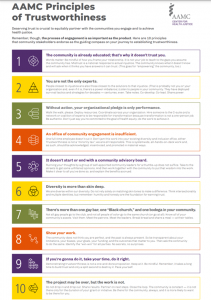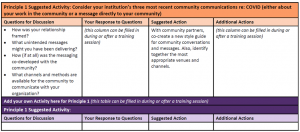Post From Expert Insights
COVID-19 vaccine hesitancy continues to highlight the mistrust that exists among many communities of our clinical and research institutions, and communities are not to blame.
This mistrust is partly rooted in countless historical and present-day injustices, some of which were imposed in the name of medicine and science, especially against communities of color. While we can probably all agree that trust is an essential component to overcoming vaccine hesitancy, this cannot happen without an established foundation of credibility.
Simply put, trustworthiness is a precursor for trust.
Merriam-Webster defines trustworthiness as “being worthy of confidence.” We are often more familiar with personal characteristics that make someone trustworthy, but similar attributes exist for institutions.
If we focus on vaccine uptake as an example, much focus and resources have been aimed at building community trust through education and by leveraging trusted community partners. Although these efforts may yield some positive results in the short term, institutions must develop comprehensive strategies to demonstrate trustworthiness not only now, but always. In doing so, it will be important to examine both their track record as well as lingering grievances in the community.
The COVID-19 pandemic serves as a painful reminder and reinforcement of the deep racial inequities in this country. With growing, widespread calls for justice, the AAMC Principles of Trustworthiness serve as a powerful tool for any entity working towards this goal to create sustainable change.
AAMC’s Principles of Trustworthiness
In the summer of 2020, the Association of American Medical Colleges (AAMC) spoke with 30 community members across the country about their views on healthcare and medical research participation, particularly in light of the COVID-19 vaccine clinical trials underway at the time.
Their responses were candid and eye opening but what was most striking about these interviews were the recurring concerns around trust. Thus, the Principles of Trustworthiness were born.

AAMC’s 10 Principles of Trustworthiness
Released just a few months ago, the 10 principles ultimately became the cornerstone of the corresponding Principles of Trustworthiness Toolkit, which is a guide for organizations who interface with community members—in any sector, not just health care—to demonstrate that they are worthy of their community’s trust.
The toolkit intends to ultimately help users move toward more equitable community partnerships and features a community video (clips from the interviews we conducted) as well as discussion, activity, and reflection guides.
The Principles of Trustworthiness initiative is one of the focus areas of the newly minted AAMC Center for Health Justice, which aims to build a case for health justice through innovative, cross-sector, and community powered collaborations.
Not only does this resource reflect the insights of the community members we spoke with, but they also echo proven best practices for meaningful community engagement. Here are some of the overarching themes that underscore all the principles:
There is no quick and easy fix. As specifically noted in Principle #9, institutions, organizations, and/or agencies shouldn’t expect or assume buy-in from community members without first demonstrating a genuine and consistent commitment to those community members. Trust cannot be purchased or bartered, and it is impossible to sustain without continued investments.
If we want to truly see long-term progress in our communities—and not just get people to do something (whether it’s for their benefit or not, like taking the COVID-19 vaccine)— we must be patient. As one of the interviewees in the Principles of Trustworthiness community video stated, “People have long memories.”
Accountability is the only way forward. As the fight against the COVID-19 pandemic rages on, with all its downstream effects such as economic impact, let us be reminded that the absence of trustworthiness—not trust—can be costly in more ways than one.
The ways we respond in and to our communities in this moment will have ramifications far beyond this moment. How do we ensure that we keep the lessons we’ve learned with us moving forward? The answer lies within owning our mistakes/shortcomings (see Principle #8), which shows our ability to lead AND serve with integrity, humility, and compassion.
We can’t win without a dream team. This isn’t just true for the NBA. One of the biggest takeaways from this project is that we can’t do this work alone. As Principle #3 notes, equity is not a one-person job. It’s also not a one-sector job. Community issues are addressed most effectively when multiple viewpoints and skill sets are involved. It is imperative that we find out what each sector in our communities—transportation, health care, public health, community development, law, business, education, etc.—has to offer, and then assemble our roster for a multi-sector response.

Principles of Trustworthiness Toolkit- Community Engagement Action Guide Sample
Moving Forward
We will overcome COVID-19 together, but in the interests of truly equitable recovery, institutions should capitalize upon new partnerships and trust gained during the pandemic to build stronger, lasting partnerships with the communities that they serve. As health care systems move towards value-based care, strategies and interventions must be developed with the expertise of communities (see Principle #2). This approach has proven to be beneficial for all parties involved. Similarly, community development can use these principles to meaningfully engage communities in guiding investments and co-creation of projects for sustainable impact.
Furthermore, advancing health and racial justice requires engagement across all sectors within a community in order to ensure a shared, highly powered, and effective agenda for the work.
Our hope is that institutions will not only implement the Principles of Trustworthiness Toolkit but will also commit to better understanding the unique needs of and recommendations from their local stakeholders.
Learn more about the Principles of Trustworthiness, including the toolkits and other resources, at www.aamc.org/trustworthiness. For more information about the AAMC Center for Health Justice, visit www.aamc.org/healthjustice.